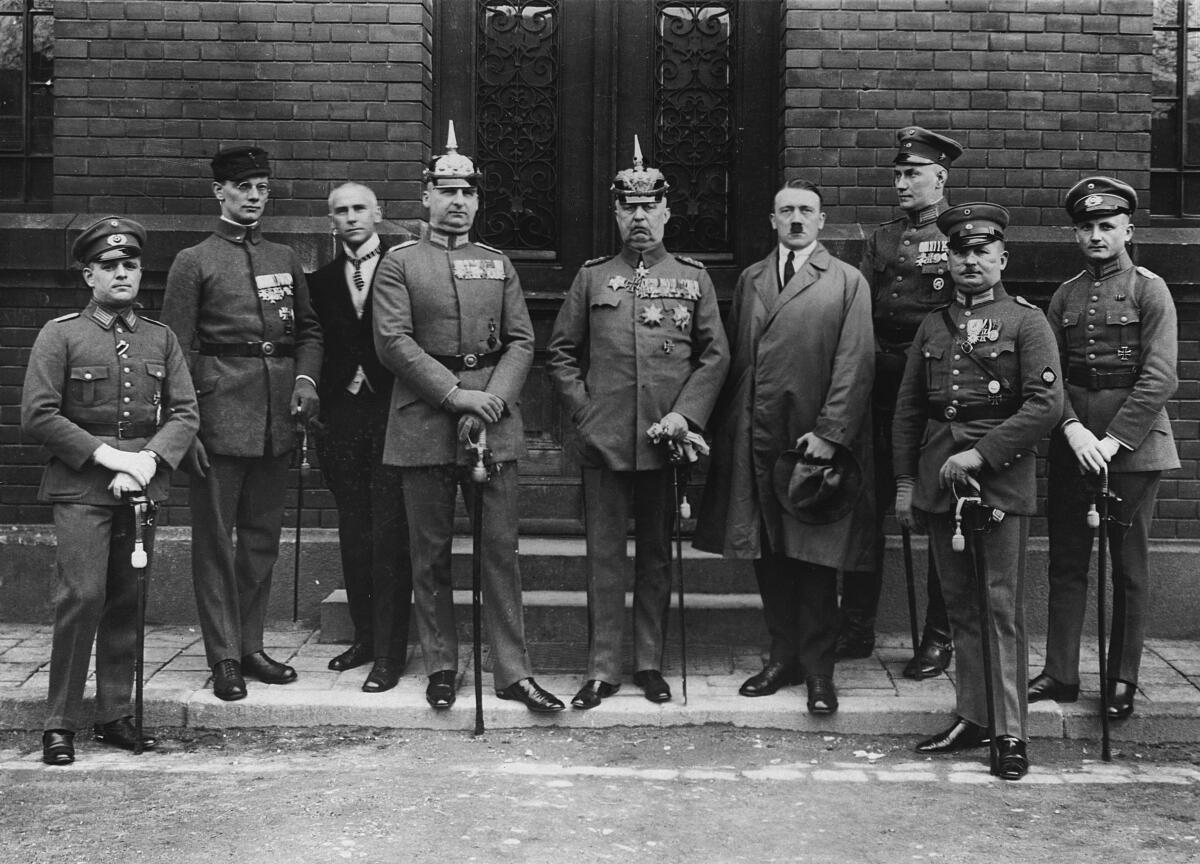Opinion: Trump turns his trials into a soapbox. Does he know he’s channeling Hitler?

- Share via
When Adolf Hitler was convicted of treason on April 1, 1924, for leading an armed insurrection against Germany’s democratically elected government, he discovered something remarkable: Courtrooms can make excellent soapboxes for political grandstanding. In real time, 100 years later, we’ve been watching another political leader, former president and current Republican presidential candidate Donald Trump, do the same. The echoes are uncanny and disturbing.
During his monthlong trial in March 1924, followed by his conviction, Hitler railed against Germany’s democratic leaders and constitutionally anchored legal system. He chastened his judges. He threatened his prosecutors. He insisted that it was not he who had committed treason against the state but the Weimar Republic’s political establishment who had betrayed the German people.
Getting a courtroom verdict on Trump’s Jan. 6 actions before the election day seems impossible. Which makes verdict at the ballot box crucial.
“You can declare us guilty a thousand times,” Hitler defiantly told the judge after receiving his conviction and a five-year prison sentence, “but the … eternal court of history will tear up the indictment and conviction with a smile and will acquit us.” The trial and conviction proved to be a political boon for Hitler, catapulting him and the National Socialist German Workers Party from the fanatic fringe to the national stage. Hitler emerged as leader and spokesman for aggrieved, right-wing nationalists across the country.
In the decade that followed, Hitler was “dragged into courtrooms” (he told his followers at a rally) more times than he could remember. He invariably emerged politically stronger thanks to the toxic alchemy of his courtroom antics and constitutionally guaranteed freedoms of expression. When Hitler lost the 1932 presidential election by more than 6 million votes, he went to court to have the results annulled amid claims of voter fraud and irregularities by state officials. The presiding judge dismissed the case out of hand, observing that the 6-million-vote margin precluded any possibility that irregularities could have changed the outcome.
Not all judges were as rational. Hitler frequently encountered sympathetic judges, who, as had happened during the Beer Hall Putsch trial, permitted him to use his courtroom appearances to hold extended tirades, which were occasionally greeted by storms of applause. Hitler’s private lawyer, Hans Frank, who was hanged in Nuremberg for his role in Nazi atrocities, once calculated that he represented his star client in more than 140 cases, mostly for defamation. Frank observed: “His opponents always ended up causing more harm to themselves, even though they thought they were damaging this ascending figure with their slander.”
The mobs attacking the Capitol were terrifying, but they aren’t the greatest danger to American democracy.
In one case, Hitler sued in court for slander against a claim that, as a young man, he had spit out a consecrated host during Holy Communion. He used the occasion to emphasize his strict Roman Catholic upbringing. The next election saw a bump up in Catholics voting National Socialist.
Unquestionably, Hitler’s most notable courtroom appearance, besides his 1924 treason trial, was in September 1930, when he appeared in court as a witness in the trial of fellow Nazis suspected of being complicit in an alleged plot to seize power in a military coup. Hitler used the occasion to underscore his Legalitätseid, or legality oath, to come to power by legal means. But Hitler did not deny or conceal his intent to destroy democracy, albeit through democratic means.
Hitler reminded the judge that Article 1 of the German Constitution stated that the government was ultimately an expression of the will of the people. “When we are finally in possession of the constitutionally guaranteed rights and powers, we will pour the state into the form that we think best,” Hitler told the judge. It was an astonishingly brazen admission, but no less astonishing than the judge’s response, “So, only by constitutional means?” Hitler’s reply was crisp, “Jawohl.” Within three years, Hitler had made good on his courtroom promise by becoming chancellor and disabling democratic structures and protections.
Trump currently faces four criminal indictments, including state election interference, retention of classified documents, hush money payments and an “extraordinary conspiracy” charge related to the Jan. 6, 2021, insurrection. Trump has called it the greatest “witch hunt in history.” With countless previous and current legal entanglements, he has probably been hauled into court more times than he can count.
Last week, when Trump appeared for a pretrial hearing in the hush money case, he railed against the judge, the judge’s family and the courtroom staff in remarks the judge called “threatening” and “inflammatory,” resulting in an expanded gag order. Trump has repeatedly attacked New York state prosecutor Letitia James, who had threatened to seize Trump’s assets to pay for the nearly half-billion-dollar judgment in his civil fraud conviction, which can be done only after appeal now that the former president posted bond.
A Republican pollster, Frank Luntz, appearing to echo the ideas of Hitler’s lawyer, cautioned against the consequences of prosecuting Trump. “If the New York attorney general starts to take his homes away, starts to seize his assets, it’s all going to be on camera,” Luntz told CNN. “You’re going to create the greatest victimhood of 2024, and you’re going to elect Donald Trump.”
History does not repeat itself, as the saying goes, but historical events can rhyme. The alarm-clanging couplet of Hitler’s and Trump’s courtroom appearances, two demagogues — separated by a century — exploiting their constitutionally guaranteed rights to free speech and due process in an effort to undermine democratic processes and structures, should serve as a sobering warning as we approach an election to determine who will be running the next government of the United States.
Timothy W. Ryback is the co-founder and director of the Institute for Historical Justice and Reconciliation in The Hague. His most recent book is “Takeover: Hitler’s Final Rise to Power.”
More to Read
A cure for the common opinion
Get thought-provoking perspectives with our weekly newsletter.
You may occasionally receive promotional content from the Los Angeles Times.











